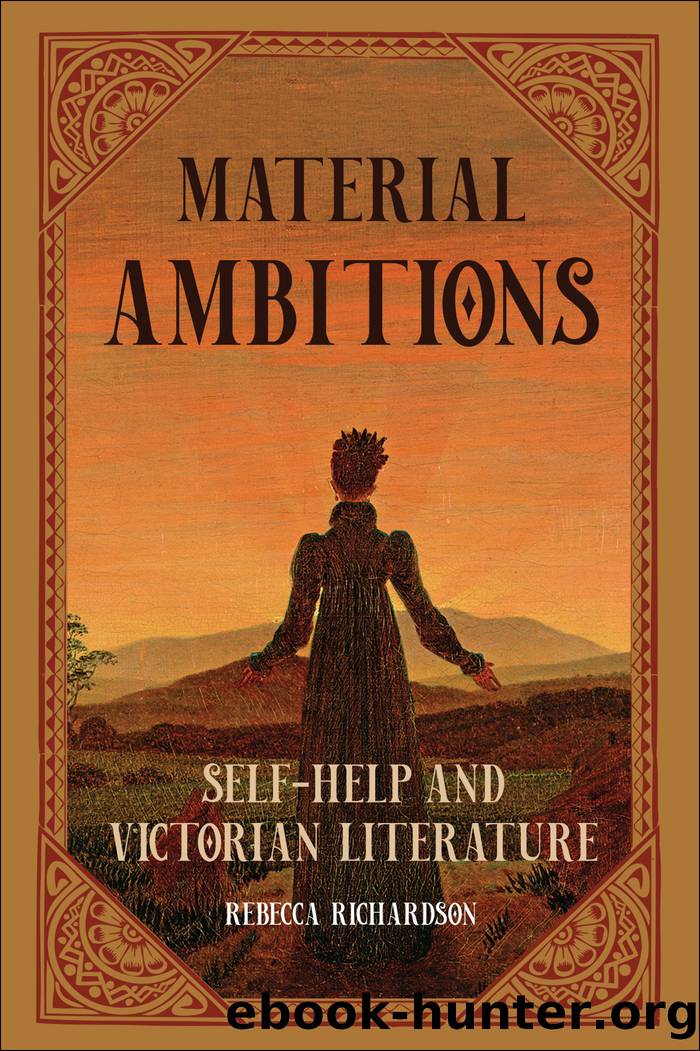Material Ambitions by Rebecca Richardson;

Author:Rebecca Richardson;
Language: eng
Format: epub
Publisher: Johns Hopkins University Press
Published: 2021-06-15T00:00:00+00:00
Undercutting and Belittling Ambition in Barry Lyndon and Vanity Fair
Barry Lyndon and Becky Sharp stand out as unscrupulously ambitious characters in Thackerayâs workâand characters that highlight how Thackeray imagined ambition across genders. In comparing these characters, Iâm participating in a long-standing interest in tracing Beckyâs character type and structural role across Thackerayâs writing. For example, John Carey has argued that âAmelia and Becky, the good and evil angels of Vanity Fair, were originally the same personâ in Ravenswing, the character of Morgiana Crump. Carey sees little of Becky Sharp in the later novels, instead arguing that ânot until the end of his career do we get a faint reflection of Becky in Elizabeth Prior, the ballet-dancer turned governess of Lovel the Widower.â33 Meanwhile, Katharine Rogers has explored Thackerayâs tendency to include opposing female typesâlike Becky and Amelia Sedleyâacross his novels.34 Such readings are suggestive for thinking about how Thackeray uses these ambitious character types and how he stuffs these energies into a single character or splits them up and counterbalances them across a character system. By limiting the field of comparison to female characters, these arguments have neglected to compare Becky Sharp to Thackerayâs other ambitious upstarts and thus to the ways ambition is differently gendered and embodied. Indeed, Rogers draws attention to this fact in a footnote: âBarry Lyndon and Denis Duval have been omitted from this discussion of Thackerayâs novels because neither has important female characters: Barry Lyndon does not really have a heroine.â35 But comparing these characters across gendered lines suggests how Thackeray uses different subject positions to imagine ambition and its tendency to manifest in competitive or even violent self-seeking.
On the surface, Thackerayâs two novels about ambitious upstarts do indeed appear irreconcilably different. Barry Lyndon of course showcases a male characterâs voice, it is in first person rather than third, and it is only a fourth the length of Vanity Fair. Although we might assume that Barryâs and Beckyâs paths will take disparate courses according to their genders, their narratives parallel one another in significant ways. Both novels are set in the past during Continental wars, and both feature ambitious characters that begin life poor and under the care of an opposite-sex parent. Both characters thus capitalize on the interest and narrative potential of an underdog.36 Compounding this, they are âotheredâ via their nationality (Beckyâs mother is French, Barry is Irish) even as they attempt to reimagine their heritage (none too accurately) as springing from aristocratic connections. Across their respective novels, both rise through advantageous marriages, engage in potentially or outright criminal acts to pursue money and powerâusually by taking it from othersâand subsequently fall from grace. These differences and similarities across the two novels suggest Thackerayâs interest in tracing the forms that ambition can take when embodied in men or women, and what these forms can do in the space of a longer or shorter novel, as narrated from different perspectives. Taken together, these novels suggest how the socioeconomic world, with its many pursuits of fortune and fashion, function like zero-sum games, with scarce titles and inheritances to go around.
Download
This site does not store any files on its server. We only index and link to content provided by other sites. Please contact the content providers to delete copyright contents if any and email us, we'll remove relevant links or contents immediately.
4 3 2 1: A Novel by Paul Auster(12393)
The handmaid's tale by Margaret Atwood(7766)
Giovanni's Room by James Baldwin(7346)
Asking the Right Questions: A Guide to Critical Thinking by M. Neil Browne & Stuart M. Keeley(5775)
Big Magic: Creative Living Beyond Fear by Elizabeth Gilbert(5774)
Ego Is the Enemy by Ryan Holiday(5450)
The Body: A Guide for Occupants by Bill Bryson(5097)
On Writing A Memoir of the Craft by Stephen King(4944)
Ken Follett - World without end by Ken Follett(4734)
Adulting by Kelly Williams Brown(4574)
Bluets by Maggie Nelson(4559)
Eat That Frog! by Brian Tracy(4540)
Guilty Pleasures by Laurell K Hamilton(4449)
The Poetry of Pablo Neruda by Pablo Neruda(4109)
Alive: The Story of the Andes Survivors by Piers Paul Read(4033)
White Noise - A Novel by Don DeLillo(4012)
Fingerprints of the Gods by Graham Hancock(4004)
The Book of Joy by Dalai Lama(3986)
The Bookshop by Penelope Fitzgerald(3854)
